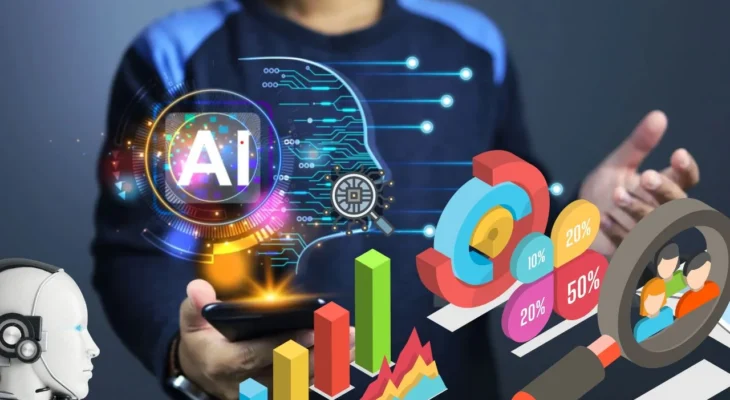Artificial intelligence is rapidly transforming the landscape of business education, and online MBA programs are at the forefront of this revolution. As technology advances, these programs are integrating AI to enhance learning experiences, personalize education, and prepare students for the AI-driven business world they’ll enter upon graduation.
AI integration in online MBA programs offers students cutting-edge skills in machine learning, data management, and language processing that are increasingly valuable in today’s job market. This technological shift is not just about adding new courses to the curriculum; it’s fundamentally changing how education is delivered and consumed. From AI-powered tutoring systems to virtual reality simulations, these tools are creating more engaging and effective learning environments.
You’ll find that AI is also reshaping the content of MBA programs. As businesses across industries adopt AI technologies, MBA curricula are evolving to include more courses on AI strategy, ethics, and implementation. This ensures that graduates are well-equipped to lead in an era where AI is becoming integral to business operations and decision-making processes.
Empowering Business Education with AI
AI is revolutionizing MBA programs, equipping students with cutting-edge skills and insights. Business schools are leveraging AI to enhance learning experiences and prepare future leaders for an AI-driven business landscape.
Quantic is a key example of this, leveraging AI in their MBA programs to future proof their students – see Quantic School of Business and Technology reviews here.
Innovation and AI in Business Schools
Business schools are rapidly adopting AI technologies to stay ahead of industry trends. You’ll find AI-powered tools enhancing course delivery, personalizing learning paths, and streamlining administrative tasks.
Many programs now offer AI-focused electives and specializations. These courses cover machine learning, natural language processing, and AI ethics.
Some schools have even partnered with tech companies to provide hands-on experience with state-of-the-art AI systems. This collaboration ensures students gain practical skills valued by employers.
AI Technologies Shaping MBA Curriculum
AI is transforming core MBA subjects like finance, marketing, and operations management. You’ll encounter AI applications in:
- Financial modeling and risk assessment
- Customer behavior prediction
- Supply chain optimization
- Data-driven decision making
Generative AI tools are being integrated into coursework, allowing you to explore AI-assisted content creation and analysis. This exposure prepares you for the AI-augmented workplace you’ll likely encounter after graduation.
Developing AI Skills for Business Leadership
MBA programs now emphasize AI literacy as a crucial leadership skill. You’ll learn to:
- Identify AI opportunities in various business contexts
- Understand AI’s limitations and ethical considerations
- Manage AI implementation projects
- Interpret AI-generated insights for strategic decision-making
Case studies and simulations will help you practice applying AI in real-world scenarios. Many programs also offer coding workshops to give you hands-on experience with AI tools and programming languages.
By developing these skills, you’ll be well-equipped to lead AI initiatives and drive innovation in your future career.
Transformative Impact of AI on Business Functions
AI is revolutionizing key business functions through advanced analytics, enhanced customer experiences, and optimized operations. Its integration is reshaping how companies make decisions, serve customers, and execute strategies.
Revolutionizing Analytics and Data Science
AI-powered analytics tools enable you to extract deeper insights from big data. Machine learning algorithms can identify patterns and trends that humans might miss. You can now make more accurate predictions about market trends, customer behavior, and financial outcomes.
Natural language processing allows you to analyze unstructured data from sources like social media and customer feedback. This gives you a more comprehensive view of your business landscape.
AI-driven data visualization tools make complex information easier to understand and act upon. You can create interactive dashboards that update in real-time, allowing for faster and more informed decision-making across your organization.
Enhancing Customer Service with AI Tools
AI chatbots and virtual assistants are transforming customer service. These tools can handle routine inquiries 24/7, freeing up your human agents to focus on more complex issues.
Natural language processing enables these AI assistants to understand and respond to customer queries in a more natural, conversational manner. This improves the overall customer experience and satisfaction.
AI can analyze customer data to provide personalized recommendations and support. You can anticipate customer needs and proactively offer solutions, leading to increased loyalty and sales.
AI-Driven Business Strategy and Operations
AI is reshaping how you develop and execute business strategies. Predictive analytics can help you identify new market opportunities and potential risks.
In operations, AI optimizes supply chains by predicting demand fluctuations and identifying potential disruptions. This leads to reduced costs and improved efficiency.
AI-powered financial modeling tools enable you to make more accurate forecasts and better manage resources. You can run complex simulations to test different scenarios before making critical decisions.
Process automation through AI reduces errors and speeds up routine tasks. This allows your team to focus on higher-value activities that drive innovation and growth.

